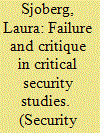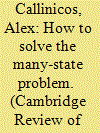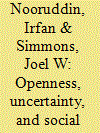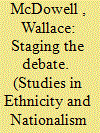|
|
|
Sort Order |
|
|
|
Items / Page
|
|
|
|
|
|
|
| Srl | Item |
| 1 |
ID:
092660


|
|
|
| 2 |
ID:
164287


|
|
|
|
|
| Summary/Abstract |
Debates imitates scholarship, which imitates debate. Using perspectives from both my policy debate career and my research career, this article argues that the enterprise of critique, whether in critical security studies or elsewhere, is always and already failing and failed. It proceeds in four sections. The first section sets up my entry into the problems of/with critique. The second section analyzes the types of dissonances inherent in the production of critical security studies scholarship. The third section theorizes those dissonances as failures – arguing that failure itself is a part of in and of critical security studies. The conclusion discusses where to go from, during, and in a world of failed critique in critical security studies.
|
|
|
|
|
|
|
|
|
|
|
|
|
|
|
|
| 3 |
ID:
103871


|
|
|
| 4 |
ID:
110410


|
|
|
| 5 |
ID:
088968


|
|
|
|
|
| Publication |
2009.
|
| Summary/Abstract |
For over two decades, scientific and political communities have debated whether and how to act on climate change. The present paper revisits these debates and synthesizes the longstanding arguments. Firstly, it provides an overview of the development of international climate policy and discusses clashing positions, represented by sceptics and supporters of action on climate change. Secondly, it discusses the market-based measures as a means to increase the win-win opportunities and to attract profit-minded investors to invest in climate change mitigation. Finally, the paper examines whether climate protection policies can yield benefits both for the environment and the economy. A new breed of analysts are identified who are convinced of the climate change problem, while remaining sceptical of the proposed solutions. The paper suggests the integration of climate policies with those of development priorities that are vitally important for developing countries and stresses the need for using sustainable development as a framework for climate change policies.
|
|
|
|
|
|
|
|
|
|
|
|
|
|
|
|
| 6 |
ID:
151653


|
|
|
|
|
| Summary/Abstract |
This article asks when, how, and why states started to use the concept of international community in the shared language of diplomacy and international law. It argues that the concept was accepted to the interstate language as a result of debates over international institutions, which were to acquire a universal character, at the Hague Conferences of 1899 and 1907. The article suggests that conceptual changes in interstate language should be understood as products of rhetorical power struggles, in which some arguments lose the battle while others prevail, some concepts are discarded while others modified. The article suggests a model of conceptual change that explains an innovation in interstate language. First, it draws attention to collective assertive speech acts at diplomatic events that signal changes in international politics. Second, it examines whether such acts implicate conceptual innovations. Third, it posits that the composition of epistemic community assembled at the Hague determines the nature of conceptual innovation. Fourth, it demonstrates how rhetorical interventions into debates at the conference introduce and mould relevant concepts. Fifth, it illuminates how contextualisation of the conference interventions in professional debates helps us understand the polemical nature of arguments and the scope of conceptual innovation.
|
|
|
|
|
|
|
|
|
|
|
|
|
|
|
|
| 7 |
ID:
087857


|
|
|
|
|
| Publication |
2009.
|
| Summary/Abstract |
This article responds to the debate provoked by the author's 'Does capitalism need the state system?' (Cambridge Review of International Affairs, 20:4 2007, 533-549) and his exchanges with Justin Rosenberg (Cambridge Review of International Affairs, 21:1 2008, 77-112). It is divided into three parts. The first restates the issues, situating them in the context of a growing Marxist preoccupation with the international in recent years, and contrasts the 'high road'-Rosenberg's attempt to use Trotsky's concept of uneven and combined development to provide a transhistorical perspective on intersocietal relations-with Callinicos's own preferred 'low road' of more focused analysis centred on the prevailing mode(s) of production. The second addresses the fundamental criticisms addressed to him by Hannes Lacher, Benno Teschke and John M Hobson, all of whom deny that there is a necessary relation between capitalism and the interstate system. The third considers the more specific comments offered by Neil Davidson, Gonso Pozo-Martin, and Jamie Allinson and Alex Anievas, before concluding with an appeal for a move off the terrain of abstract theory to more empirical studies that can test the relative value of rival conceptual constructions.
|
|
|
|
|
|
|
|
|
|
|
|
|
|
|
|
| 8 |
ID:
091034


|
|
|
|
|
| Publication |
2009.
|
| Summary/Abstract |
We extend the literature on openness and spending in developing countries arguing that the effect of increasing openness depends on both regime type and the level of openness. Democracies respond to increases in openness by increasing spending while dictatorships respond by decreasing spending. However, the degree to which countries pursue the strategy of choice depends on the level of openness. In autarkic countries, an increase in import competition has more severe consequences for perceptions of job insecurity and dislocation. In response, government management of openness will be more vigorous under these conditions regardless of whether the leader increases or decreases spending. Economic selection mechanisms at work will produce an outcome wherein, at higher levels of openness, further import liberalization has smaller effects on perceptions of job insecurity and dislocation. Hence, both the demand and the supply of government management of openness will be lower.
|
|
|
|
|
|
|
|
|
|
|
|
|
|
|
|
| 9 |
ID:
088849


|
|
|
|
|
| Publication |
2009.
|
| Summary/Abstract |
This paper, which emanates from the field of theatre studies, examines plays written by Belfast writer Gary Mitchell in and around the time of the Good Friday (Belfast) Agreement of 1998. Mitchell occupies a unique position in Irish theatre, being the first playwright to emerge from and offer a dramatic critique of paramilitary-dominated Loyalist communities. Central to the paper is the argument that Mitchell offers a set of important insights into how such communities reflect academic debates around masculinities, imagined national communities and the relationship between masculinity and violence. The paper looks at three plays which received premieres around the time of the Belfast agreement and utilises the theoretical approaches offered by proponents of hegemonic masculinity as well as post-Foucauldian thinkers
|
|
|
|
|
|
|
|
|
|
|
|
|
|
|
|
|
|
|
|
|